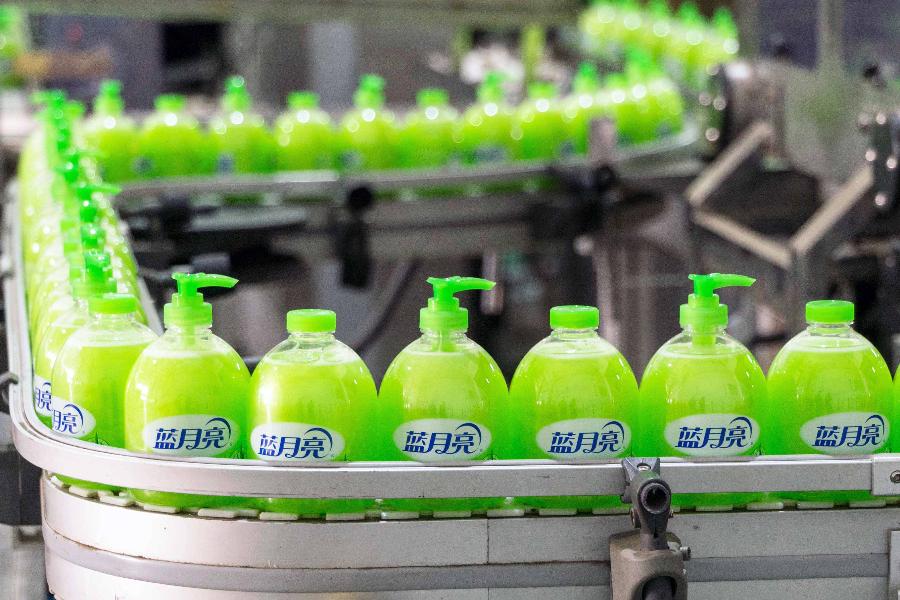Blue Moon shines on livestreaming, consumer staple status

China’s leading laundry detergent maker said its sales rose 38% in the first half of the year, though its net loss also widened as it spent heavily on e-commerce promotions
Key Takeaways:
- Blue Moon posted strong double-digit sales gains in the first half of the year, even as many Chinese consumer brands have recorded revenue declines
- The company could be well placed to weather China’s economic slowdown due to its focus on key daily-use products, helped by growth from its e-commerce initiatives
By Doug Young
Makers of discretionary products like luxury goods and cosmetics are singing the blues in China these days, as increasingly cautious consumers rein in their spending on such items that are nice to have but easy to ditch in lean times. But more basic daily goods like groceries and laundry soap may be holding up better, and even be outperforming the market, as consumers spend more time at home to save money.
That growing gap comes shining through in an announcement this week previewing Blue Moon Group Holdings Ltd.’s (6993.HK) performance in the first half of this year. Somewhat ironically, the announcement’s labeling as a “profit warning” creates a misleading impression that things weren’t too smooth at China’s leading detergent and liquid soap maker in the six months through June.
But a close look shows the company’s sales recorded a big jump during the period, even as retailers from other sectors like cosmetics and luxury goods have reported declines. It’s true that Blue Moon’s loss also widened considerably for the six-month period, hence the “profit warning designation.”
But in this case the loss is the result of heavy spending on the company’s e-commerce channels, most notably livestream selling that has become all the rage in China these days. It’s also from heavy spending on a new generation of products outside its core Blue Moon brand, including ones targeting a younger generation of more environmentally conscious consumers.
“With livestreaming e-commerce becoming increasingly popular in the first half of 2024, the group has increased its selling and distribution expenses to focus on planning for its sales and marketing on online e-commerce platforms, which help consolidate its market position on these online e-commerce platforms and fuel its long-term sales growth,” Blue Moon said.
The heavy spending on such new initiatives helped to fuel a jump of 38% or more in the company’s sales during the first half of the year, according to the announcement. That led to a year-on-year rise in gross profits and gross profit margins, it added. But the higher sales, marketing and distribution expenses undermined the company’s bottom line, with the result that its net loss for the period jumped to HK$665 million ($85 million) from a HK$167.5 million loss a year earlier.
Here, we should point out that Blue Moon is quite profitable in general, though its net profit last year fell sharply to HK$325 million from HK$611 million a year earlier, partly due to foreign exchange losses. The first half losses fall into a general pattern for the company that typically sees it lose money in the first half of the year, but still report annual profits for every year dating back to its 2020 IPO.
Despite the profit warning, investors were clearly focused on the big sales increase as Blue Moon’s stock rose 5.4% in Thursday trade the day after the announcement. That rally brought the stock back to the same level where it began the year, though it has traded mostly lower since January.
Highly valued
We certainly shouldn’t whitewash this company’s story too much, despite its e-commerce gains and growing status as a stock that’s less vulnerable to China’s economic downturn. Even after the Thursday rally, Blue Moon’s shares are down more than 80% from their 2020 IPO price, reflecting a broader downtrend for Hong Kong-listed Chinese stocks over that period.
Still, the stock currently trades at a price-to-earnings (P/E) ratio of 35, which looks quite strong for this kind of consumer staples company. That ratio is more than double the 16 for leading beer maker Tsingdao Brewery (0168.HK), and is also ahead of global giants Procter & Gamble (PG.US) and Colgate-Palmolive (CL.US), which trade at 28 and 32, respectively.
A deeper dive into Blue Moon’s latest announcement appears to show the company has only recently discovered the livestreaming phenomenon and is also a relative newcomer to the environmentally friendly concept. It said sales from its “new e-commerce channel” rose by 4.5 times in the first half of this year from a year earlier, and notes that it sold more than 10 million bottles of its newer Zhizun Biotech Liquid Laundry Detergent, a concentrated, more environmentally friendly product, in a single live streaming session.
The company makes no mention of either livestreaming or “new e-commerce” in its annual report for 2023, and makes only brief reference to Zhizun’s launch last year, suggesting these initiatives are all quite recent.
The big livestreaming event that boosted Zhizun sales appears to have occurred during this year’s June 18 online shopping festival that is one of two major online shopping events each year in China. Blue Moon says it “ranked first in terms of cumulative sales on multiple major e-commerce platforms” during this year’s festival, implying its sales were up year-on-year, though it didn’t explicitly say how this year’s performance compared with 2023.
The overall festival wasn’t too festive for e-commerce retailers in general in the current environment of growing consumer caution. Retail data provider Syntun reported revenue from the festival fell 7% this year to 742.8 billion yuan ($103 billion) year-on-year – marking the first decline since it began tracking the event in 2016. A recent downward revenue revision by cosmetics seller Yatsen (YSG.US) to its second-quarter revenue outlook also implied the company performed poorly during the festival.
Broader market data from China’s National Bureau of Statistics shows the country’s retail sales were also weak in June, rising just 2% year-on-year, marking the slowest gain since December 2022. Cosmetics sales plunged 14.6% during the month, while gold and jewelry sales also slumped 3.7%, reflecting the trend we mentioned at the start of this review for weakness among non-essential goods.
While Blue Moon looks like a good defensive play in such economically shaky times, things haven’t been all rosy for the company either. Its revenue actually fell 8% last year to HK$7.32 billion yuan, and we’ve already mentioned that its loss for the year widened. But analysts expect it to return to revenue growth this year, and e-commerce now accounts for more than half of the company’s revenue and growing. With those positive trends as a catalyst, combined with its defensive nature, the stock could still have some potential upside despite its high valuation.
To subscribe to Bamboo Works free weekly newsletter, click here





